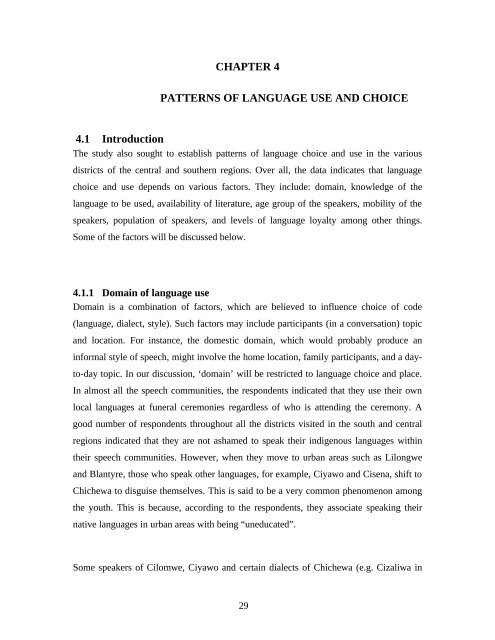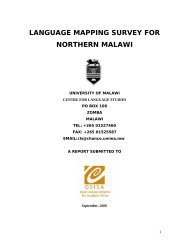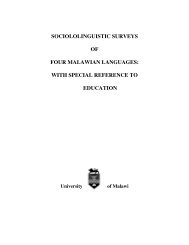Executive Summary - Centre for Language Studies
Executive Summary - Centre for Language Studies
Executive Summary - Centre for Language Studies
Create successful ePaper yourself
Turn your PDF publications into a flip-book with our unique Google optimized e-Paper software.
CHAPTER 4PATTERNS OF LANGUAGE USE AND CHOICE4.1 IntroductionThe study also sought to establish patterns of language choice and use in the variousdistricts of the central and southern regions. Over all, the data indicates that languagechoice and use depends on various factors. They include: domain, knowledge of thelanguage to be used, availability of literature, age group of the speakers, mobility of thespeakers, population of speakers, and levels of language loyalty among other things.Some of the factors will be discussed below.4.1.1 Domain of language useDomain is a combination of factors, which are believed to influence choice of code(language, dialect, style). Such factors may include participants (in a conversation) topicand location. For instance, the domestic domain, which would probably produce anin<strong>for</strong>mal style of speech, might involve the home location, family participants, and a dayto-daytopic. In our discussion, ‘domain’ will be restricted to language choice and place.In almost all the speech communities, the respondents indicated that they use their ownlocal languages at funeral ceremonies regardless of who is attending the ceremony. Agood number of respondents throughout all the districts visited in the south and centralregions indicated that they are not ashamed to speak their indigenous languages withintheir speech communities. However, when they move to urban areas such as Lilongweand Blantyre, those who speak other languages, <strong>for</strong> example, Ciyawo and Cisena, shift toChichewa to disguise themselves. This is said to be a very common phenomenon amongthe youth. This is because, according to the respondents, they associate speaking theirnative languages in urban areas with being “uneducated”.Some speakers of Cilomwe, Ciyawo and certain dialects of Chichewa (e.g. Cizaliwa in29





